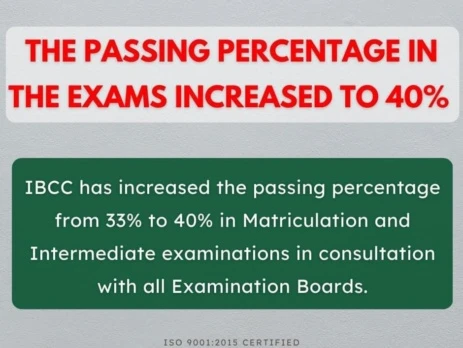Inter Board Committee of Chairmen approved the new grading system for Matric and Intermediate exams. This initiative aims to modernize academic evaluation and reduce undue stress on students.
According to the new system, the pass percentage of all boards will be increased from 33% to 40%. GPA system will be introduced and the marks sheet will no longer mention the marks obtained by the student.
Key Changes in the New Grading System
Higher Passing Marks and Grace Marks
The passing threshold has been raised from 33% to 40%, aligning with international standards for academic achievement. Additionally, students will now benefit from up to 5 grace marks, applicable across a maximum of two subjects. However, students failing in a third subject will not be eligible for these grace marks.
Interestingly, an earlier proposal to increase grace marks to 7 was deliberated but ultimately rejected by a majority of IBCC members during the meeting.
Reduction in Academic Pressure
This revised system aims to reduce competition and the stress often associated with securing high scores. By adopting a more inclusive and lenient approach, the grading system seeks to foster a healthier academic environment for students nationwide.
Nationwide Standardization and Equal Opportunities
One of the standout features of the new policy is the emphasis on standardizing examinations across Pakistan. By creating a unified assessment framework, the IBCC aims to offer equal educational opportunities for all students, regardless of their regional or socioeconomic backgrounds.
A Transition from Numbers to Grades
Starting in 2025, the system will officially transition from the traditional numerical marking scheme to a grade-based evaluation. This shift, also announced by the Sindh government, represents a step towards a more comprehensive and holistic evaluation of student performance.
Grading Scale Breakdown
The updated grading system provides a detailed classification of academic performance, ranging from "Exceptional" to "Unsatisfactory":
- A++ (Exceptional): 95% and above
- A+ (Outstanding): 90–94%
- A (Excellent): 85–89%
- B++ (Very Good): 80–84%
- B+ (Good): 75–79%
- B (Fairly Good): 70–74%
- C (Above Average): 60–69%
- D (Average): 50–59%
- E (Below Average): 40–49%
- U (Unsatisfactory): Below 40%
Abolishing Position-Based Recognition
To further emphasize a holistic approach, the IBCC has eliminated first, second, and third positions. Instead, the focus will shift towards providing a nuanced evaluation that better reflects individual abilities and achievements.
A Step Toward Educational Reform
This development signifies a broader trend of reforming the Pakistani education system to align with global best practices. By reducing the emphasis on competition and numbers, the IBCC hopes to cultivate a generation of students who prioritize learning and critical thinking over rote memorization.
This new grading framework, set to take effect in 2025, is expected to create a more inclusive and equitable academic environment for Pakistani students.
Stay Informed
For more updates on educational reforms in Pakistan, visit our website regularly.




.webp)
.webp)
.webp)
.webp)
.webp)



